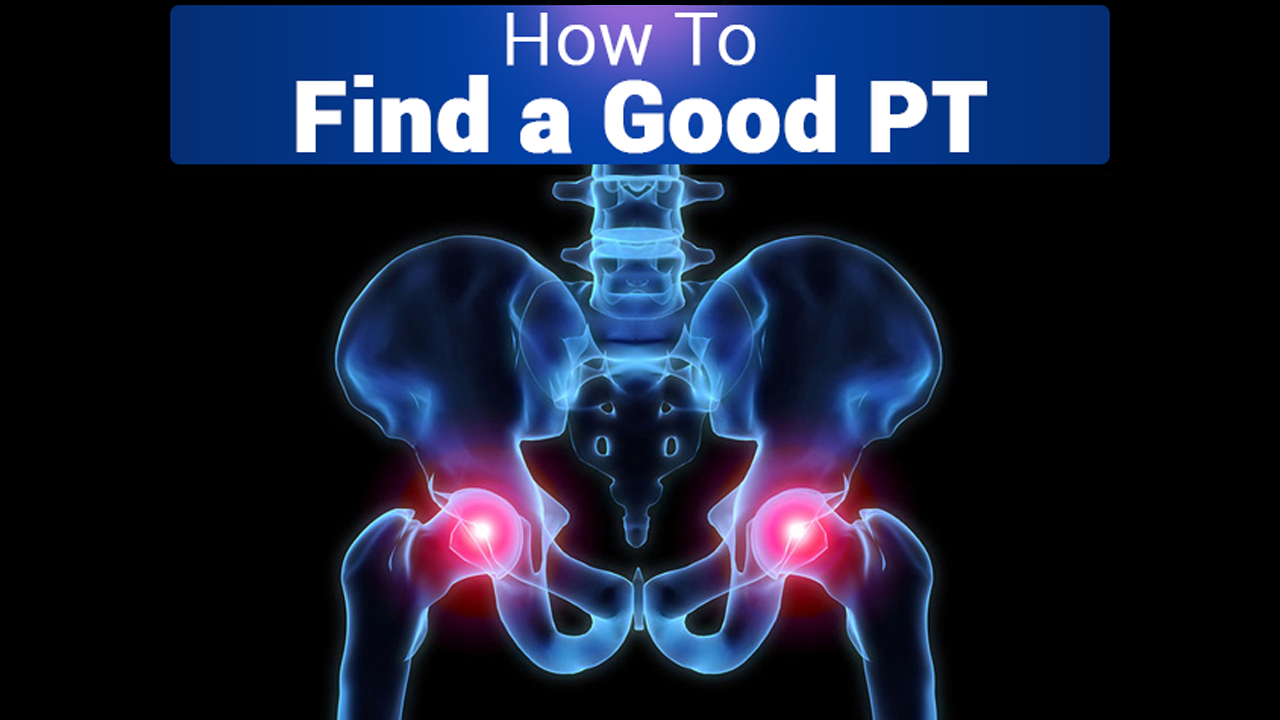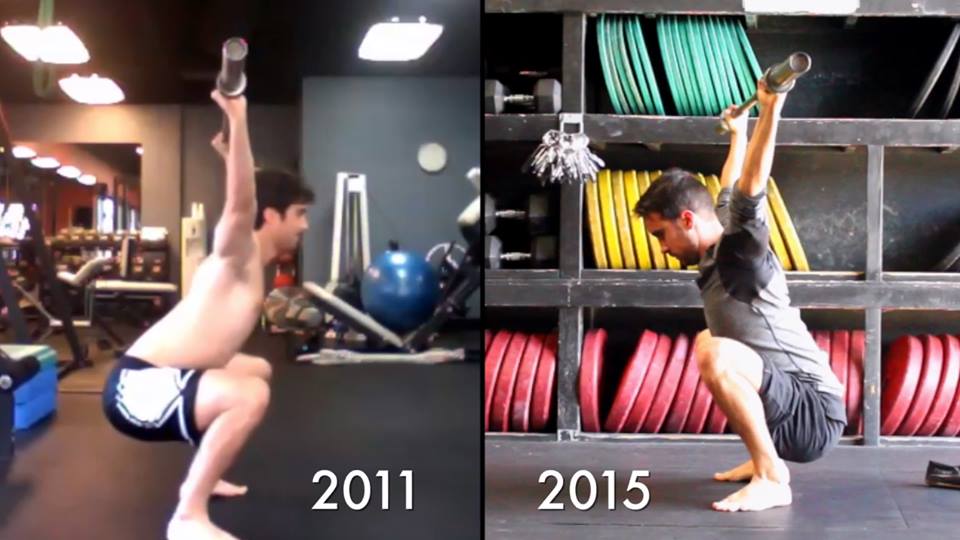Physical Therapy for FAI - Part 2

Read/watch Part 1 of this series here:
Physical Therapy for FAI - Part 1: (what is it missing?)
Part 2 - The Cost Of Finding A Good PT
If you have femoroacetabular impingement (FAI) and you've ever been frustrated with your physical therapy or chiropractic experience...welcome to the club.
In 2011 I began looking for non-surgical ways of treating the cam impingement in my right hip. This led me on a long and expensive journey.
In fact, I just checked my Quickbooks to see how much I’ve spent on fixing my body or doing preventative maintenance over the past five years and it actually surprised me. In total I've spent $25,837.29 out of pocket (which doesn't include what my insurance covered.)
These costs included regular physical therapy, chiropractic, massage and various other treatments.
The sad part is out of all that therapy and all of those treatments I felt only about 5% were worth it. The rest of the time I typically felt no benefit at all.
In fact, in all those five years I only came across two practitioners who I still see and consider really good at what they do.
Investing $25,837.29 and spending 2-3 hours per day researching healing modalities taught me some valuable lessons and led me to one particularly great healer - Phil Petachenko in Encinitas, CA who I still see to this day.
This article is to help you to find your own "Phil", conquer your hip problems and get your life back. I will be referring to any practitioner (PT, chiropractor, massage therapist, etc) as a "healer" since that is the essence of what they do.
Top 8 Clues You've Found a GREAT Healer
1.) Care

Do you get the sense that the actually care about you and about getting to the root causes of your pain or are they just in a hurry to get you out the door so they can get on to the next patient?
The truth is...some people are just in it for the money.
Others are in it for the money but they do also want make a difference...as long as it fits into the alloted 15-30 minutes.
...and finally there are the rare 1% who are primarily interested in doing what is best for you (even if its not in their best economic interest.)
My chiropractor (Phil), who primarily works by doing deep tissue bodywork, always spends at least an hour with every patient (and often longer) and never accepts tips. Not once have I ever felt rushed or like he was just in it to get my money. That's just one of the reasons I keep giving him my money!
2.) Humility
Do they exude openness and curiosity or do they seem arrogant and closed-off to other perspectives?
If you suggest collaborating with another professional do seem open or closed to the idea?
Over the past five years I've sampled more therapists and healers than I can count. Phil always says "good! keep exploring!"
When I inevitably return somewhat disapointed he never has anything negative to say about the other person or profession. He may point out some of the limitations of certain approaches, but it is never with a "holier-than-thou" attitude.
Humility is important in a great healer because arrogance shuts the therapist off from the possibility of learning. Humility is more of a stance of "I have a theory but I don't know everything...lets investigate!"
In contrast, an arrogant therapist will try to give you a quick and official-sounding diagnosis and then its "case closed" on any other possibilities.
Look for a healer with an open mind who exhibits humility. This will keep many more doors open for your recovery.
3.) Time
How much time do they spend with you?
Do you get a sense that they are taking time to thoroughly understand your situation or are they rushing so they can get to the next patient?
If you spend half your session sitting on some stim machine or are passed off to a junior practitioner, you may want to keep searching.
I don't think there is any way around it. Healing and learning how to avoid future problems takes time. Find someone who is willing to invest it.
4.) Logical / Systematic Approach

Is their approach holistic or are they a one trick pony?
- Do they include soft tissue work?
- What about stretching and flexibility for range of motion?
- What about motor control and strengthening?
- Joint manipulations as needed?
- Do they talk to you about habits and lifestyle changes?
- Do they discuss how your mind and mental habits can effect your physicality (without getting too "woo-woo.")
Well-rounded approaches lead to better results. If they don't teach all aspects of a well-rounded recovery program personally, ask if they have any good referrals to other practitioners who can supplement their work.
5.) Homework
Do they emphasize that this will be a team effort? Thorough treatments require YOU do part of the work.
Phil told me from day one; "this is going to be a team effort and in fact you will be responsible for most of the work."
Setting this expectation early helped me to break out of the mindset that anyone else can or will ever fix all my problems.
The other great advantage of the team effort approach is that I could immediately try to mimick the work he had done on my body on my own. I remember back in 2011-2014 I used to leave his office and immediately go write down notes on my iPhone about how I could mimick the bodywork he had just done on me.
It took me several years to be able to be as effectively as him when working on myself, but these days I am my own best therapist and I use him for supplemental "tuneups" as needed.
Taking 100% ownership over the care of your body and the homework they give pay great dividends in the long run.
Think of it like going back to get your PhD in self-care.Your 80 year old self with thank you!
6.) Call You On Your Crap (Compassionately)

Three months into my work with Phil I was complaining about a pinch in my hip. After examining my legs, he politely "called me out" for a lack of progress in my quads. The backstory was that had given me some homework to do more tissue work on my quads but I had not been doing it diligently.
With no trace of judgement or annoyance in his voice he said:
"Well...its pinching because you need to be doing more work on this area. This is WAY too tight."
I remember being taken aback by how "matter-of-fact" he seemed about it. I took him at his word about it and got to work on those dense quads. Shortly thereafter the pinch in my hip went away. Imagine that!
7.) Benefits Here and Now?
The #1 sign that you've found a good therapist or approach is that you start seeing results.
CAVEAT: It's important that you are following their approach EXACTLY as it is meant to be done and you've CONFIRMED with the therapist that you are, in fact, doing it the way its meant to be done.
Results "here and now" means; after giving them a fair trail of a few weeks or more…can you see that you are on the path of progress?
This does not mean that they fixed 30 years of poor posture and bad habits in 2 weeks…but can you see that you are on a holistic / systematic path out of pain and injury?

There are no magic or miracles, just paths of recovery that are more complete or less complete. Make sure you are on a sound path.
8.) Practice What They Preach?
Does your healer take excellent care of themselves or are they like the Doctor who smokes and eats McDonalds?
It’s one thing to have theoretical knowledge learned in PT or chiropractic school but its another thing ENTIRELY to have a deep “body care” practice of their own! For example:
- Are they an athlete themselves?
- Do they do yoga or stretch?
- Do they lifts weights and exercise?
- Do they do self-massage / tissue work?
- Do they have other healers who work on them?
If they aren't pro-actively taking great care of their body then there is a certain experiential wisdom that they don't have access too.
Look for those who are deeply practicing what they preach.
Conclusion
After years of trial and error (and spending well over $25,837 just in the past 5 years) I can definitely say that good healers are hard to find.
If you've found a good healer...hold on to them! They are like a precious gem.
To review, a good healer is someone who:
- Genuinely cares
- Is humble (doesn't know it all and is open to discovery)
- Spends a good amount of time with you (30 mins is OK, 1+ hours is great)
- Has a logical / holistic / systematic approach
- Gives you plenty of homework
- Calls you on your crap (holds you compassionately to account)
- Benefits HERE and NOW
- Practices what they preach
RESOURCES:
Obviously the #1 thing I recommend to help hip issues is The Hip Fix
I created this "do-it-yourself" program with my colleague, Matt Hsu. It includes all of the best exercises and strategies I found that helped me resolve my own FAI issues. Since 2015 we have had people using the program from all over the globe with great results.
I also think finding a good PT or manual therapist to supplement your FAI Fix journey is invaluable.
The only way to find a good healer is via trial and error. You have to experience several people to be able to know who just talks a good game and who is the real deal.
Here are some helpful quick tips to get you find a good practitioner in your area:
Massage Therapists:
I've had the best success with deep trigger point style massage. I've also had some success with A.R.T practitioners, Rolfers and some deep tissue therapists who work with athletes (bodybuilders, team-sport athletes, etc) as often these people can work the deepest.
Don't limit yourself to only these styles of body work. Often the best therapists will be largely self taught (like Phil) and:
- Be former (or current) runners or athletes themselves
- Have a lot of experience (10-20 years) OR
- Do a ton of bodywork on themselves
Physical Therapists:
Certified Orthopedic Manual Therapist (COMT)
Quick tips:
- No pills, lasers or machines that you spend 50% of your session on
- Systems approach
- Do good manual work on you
Chiropractors:
American Chiropractic Board of Sports Physicians
Quick tips:
- Be former (or current) runners or athletes themselves
- Systems approach
- Focus on gait and spine not magical fixes.
About The Author

Shane Dowd is a sports performance and mobility coach. He specializes in flexibility and injury prevention in athletes. He is the co-author of The FAI Fix program.










